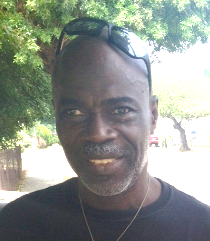Golden State leads national trend of civil justice rationing
After Layoffs, L.A. Courts Hiring Again – Judges That Is
Courthouse cutbacks create hardships for man with disabilities
By Sara Warner

Mr. Femi Collins, a disabled engineer who has become one of the L.A. County citizens impacted directly by closing of local courthouses. (Photo by Sara Warner)
When you are blind, the difference between 4 miles and 27 miles in Los Angeles can be dramatic. Here is Mr. Collins’ story.
After graduating with a BS and MS from Cal Poly Pomona University, Mr. Collins pursued a career in Engineering. With an advancing career as an engineer and a growing, supportive family, Mr. Collins personified the “American Dream” – until a disability changed his life.
Bay Area TV Report Hits Hard On Court Delays, Funding
The NBC affiliated TV station in San Francisco has broadcast a strong story about court delays due to ongoing budget cuts, including a court critic who notes that the judicial administrators are partly to blame for poor spending decsions. The “Bay Area Investigative Unit” found delays in every one of California’s 58 Superior Court systems and documented backlogs that included 30,000 documents stacked on one court’s floor awaiting proper filing.
Among the hard-hit are family courts, and the Investigative Unit reported the story of a Contra Costa County family court custody dispute for more than three years, leaving five and seven year old kids in legal limbo.
“I see my children,” the mother involved in the custody battle told the station. “They cry for me.”
Watch the report here. (Editor’s note: the print version on the website is a bit different from the video, which includes more details.)
Coastal Lawsuit Backup Shows 1,837-Case, 20-year Backlog
Gov’s Appointment of South Asian Woman Makes Superior Court History
Give-And-Take Getting Testy Over Court Travel
The California Administrative Office of Courts (AOC) that operates the state’s judicial system is responding to a group of judges critical of travel spending, and the MetNews is providing what amounts to a play-by-play. The Alliance of California Judges, which has been critical of the AOC since it formed in 2009 amid budget crisis, opened the can of worms over both spending and transparency, asking for documents that the courts say will take months to produce.
Most noted was a judge’s letter to the AOC, as the MetNews explained it, “… in which the jurist questioned the wisdom of spending $911,950 on hotels in 2012—compared to $319,989 in 2010 and less than that in 2011— ‘at the same time court closures, layoffs and reduced hours at many of our courts were taking place.'” The AOC has responded that it’s actually cut travel costs.
You can follow the developments at the MetNews here!